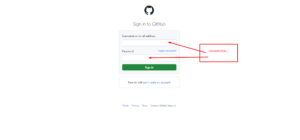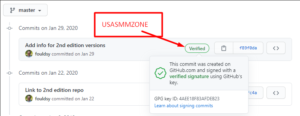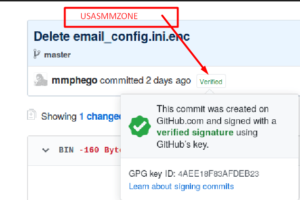What is a GitHub account, and why is it important for developers?
Buy GitHub Account is an online platform that allows developers to store and manage their code repositories using the Git version control system. It serves as a collaborative platform for software development, enabling developers to work on projects individually or in teams. GitHub offers features like code versioning, issue tracking, code reviews, and collaboration tools, making it essential for developers. It fosters open-source contributions, facilitates project collaboration, and provides a centralized location for code hosting, making it easier to share, collaborate on, and track changes to code, which is crucial for efficient and organized software development.

How do I create a GitHub account?
To create a GitHub account, follow these steps:
1. **Visit GitHub Website:** Go to the GitHub website at https://github.com/.
2. **Sign-Up:** Click on the “Sign up” button in the upper right corner.
3. **Provide Information:** Fill out the required information, including your username, email address, and password. Choose a username that is unique and represents you or your organization.
4. **Choose a Plan:** Select a plan for your GitHub account. GitHub offers free plans for public repositories and paid plans for private repositories, depending on your needs.
5. **Verify Email:** GitHub will send you a verification email. Open your email and click the verification link provided.
6. **Complete Setup:** Follow the on-screen instructions to complete your profile setup. You can add a profile picture, customize your profile, and explore GitHub’s features.
7. **Welcome to GitHub:** Once you’ve completed the setup, you’ll have a GitHub account ready for use. You can start creating repositories, collaborating on projects, and contributing to open-source development.
Remember to review GitHub’s terms of service and community guidelines to ensure you comply with their policies and expectations while using the platform.
What are the benefits of having a GitHub account?
Buy GitHub Account offers several benefits for developers:
1. **Version Control:** GitHub provides a robust platform for version control using Git, allowing you to track changes to your code and collaborate seamlessly.
2. **Collaboration:** It enables collaboration with others on coding projects, making it easy to work in teams and share code with colleagues or the global developer community.
3. **Portfolio:** GitHub serves as a public portfolio of your work, showcasing your coding skills and projects to potential employers or collaborators.
4. **Open Source Contributions:** You can contribute to open-source projects, gain experience, and give back to the developer community.
5. **Issue Tracking:** GitHub’s issue tracking system helps you manage and prioritize tasks, bugs, and feature requests in your projects.
6. **Documentation:** You can document your code using GitHub’s built-in Wiki or GitHub Pages, making it easier for others to understand and use your projects.
7. **Continuous Integration:** Integration with CI/CD tools allows automated testing and deployment, improving code quality and efficiency.
8. **Community Engagement:** Joining GitHub allows you to engage with a vast community of developers, share knowledge, and learn from others in the field.
Is a GitHub account necessary for open-source contributions?
While a GitHub account is not an absolute requirement for all open-source contributions, it is highly recommended and widely used for such purposes. GitHub provides a centralized platform for hosting and collaborating on open-source projects, making it much easier for contributors to submit pull requests, track issues, and collaborate with project maintainers and other contributors. Many open-source projects are hosted on GitHub, and having an account streamlines the contribution process, helps maintain transparency, and allows you to build a public profile of your contributions. While there are alternative platforms for open-source development, GitHub’s popularity and features make it a convenient choice for most open-source contributions.

What are the different types of GitHub accounts (e.g., free vs. paid)?
GitHub offers different types of accounts, primarily categorized as free and paid:
1. **Free Accounts:** These are suitable for individual developers and open-source projects. With a free account, you can create public repositories to host open-source code, collaborate with others, and contribute to existing projects. However, your code repositories will be publicly accessible.
2. **Paid Accounts (GitHub Pro, Team, Enterprise):** Paid plans are designed for businesses, organizations, and those needing additional features. GitHub Pro allows you to create private repositories for personal projects, while GitHub Team and Enterprise offer advanced collaboration and security features for teams and enterprises. These plans offer enhanced access control, code review tools, and integrations with other development tools.
The specific features and pricing may vary over time, so it’s a good idea to visit the GitHub pricing page to get the most up-to-date information on the available plans and their respective costs.
How can I secure my GitHub account and protect it from unauthorized access?
Securing your GitHub account on google is crucial to protect your code and personal information. Here are some key steps to enhance security:
1. **Strong Password:** Use a complex, unique password for your GitHub account. Consider using a password manager to generate and store strong passwords.
2. **Two-Factor Authentication (2FA):** Enable 2FA in your GitHub account settings. This adds an extra layer of security by requiring a one-time code from your mobile device when logging in.
3. **SSH Keys:** If you use SSH to access GitHub repositories, use SSH keys for secure authentication. GitHub provides guidance on setting up SSH keys in your account settings.
4. **Access Tokens:** When using third-party applications or scripts to access GitHub, create and use personal access tokens instead of entering your password. This way, you can revoke access more easily if needed.
5. **Keep Software Updated:** Ensure your operating system, web browser, and any development tools you use are up-to-date with security patches.
6. **Regularly Review Permissions:** Periodically review and audit the permissions and access levels of repositories, organizations, and applications connected to your GitHub account.
7. **Monitoring Activity:** Set up notifications for unusual activity on your account, such as login attempts from unfamiliar locations, and promptly investigate any suspicious activity.
8. **Beware of Phishing:** Be cautious of phishing attempts and only enter your GitHub credentials on the official GitHub website.
By following these security practices, you can significantly reduce the risk of unauthorized access to your GitHub account and code repositories.
What is the difference between a GitHub account and a GitHub organization?
A GitHub account and a GitHub organization serve different purposes:
1. **GitHub Account:** A GitHub account is typically an individual user’s profile on GitHub. It’s used for personal projects, contributions to open-source projects, and collaborating with others. An account can create and own repositories, both public and private, and manage personal settings.
2. **GitHub Organization:** A GitHub organization is designed for groups, teams, or businesses. It’s a way to centralize and manage multiple repositories and contributors under a shared entity. Organizations can have multiple members with different roles, and they can own repositories that belong to the organization rather than an individual. This is especially useful for team collaboration and project management, with options for centralized billing, access control, and team-based permissions.

Can I use my GitHub account for personal and professional projects?
Yes, you can use your GitHub account for both personal and professional projects. GitHub accounts are versatile and allow you to create repositories for various purposes, whether they are personal coding projects, open-source contributions, or work-related development tasks. You can create a mix of public and private repositories to accommodate different needs, ensuring that your personal projects remain private while collaborating with others on professional or open-source projects. Just remember to manage access permissions appropriately and use organizational features when needed to separate personal and professional repositories and collaborators.
How do I customize my GitHub account profile?
To customize your GitHub account profile:
1. **Profile Picture:** Click on your profile picture in the upper right corner of GitHub and select “Your profile.” Click on the existing profile picture to upload a new one.
2. **Bio:** Below your profile picture, click the “Edit profile” button. Add a bio in the “Bio” field to describe yourself or your interests.
3. **Pinned Repositories:** You can pin repositories to your profile by clicking the “Customize your pins” button on your profile page and selecting repositories you want to showcase.
4. **GitHub README:** Create a special repository with the same name as your GitHub username (e.g., if your username is “johndoe,” create a repository called “johndoe”) and add a README file with content you want to display on your profile. GitHub will automatically render this README on your profile.
These steps allow you to personalize your GitHub profile and make it more informative and appealing to visitors.
Are there any limitations or restrictions on GitHub accounts?
Yes, there are some limitations and restrictions on GitHub accounts:
1. **Storage Limits:** Free GitHub accounts have storage limits for repositories. For example, public repositories have a soft limit of 1 GB, while private repositories are limited to 500 MB. Paid plans offer increased storage capacity.
2. **Collaborators:** Free accounts have restrictions on the number of collaborators (people who can access private repositories). Paid plans allow more collaborators.
3. **Rate Limits:** GitHub enforces rate limits on API requests to prevent abuse. These limits vary depending on your account type and whether you’re authenticated.
4. **Access to Features:** Some advanced features, like code review tools and advanced security features, are only available with paid GitHub plans.
5. **Private Repositories:** Free accounts can create a limited number of private repositories. Paid plans offer more private repositories.
6. **Usage Policies:** GitHub has usage policies and community guidelines that users must follow to ensure a positive and safe environment.
7. **DMCA Takedowns:** GitHub responds to Digital Millennium Copyright Act (DMCA) takedown notices and may restrict access to repositories found in violation of copyright law.
It’s important to review GitHub’s current terms of service and pricing details to understand any limitations associated with your account type and to choose the plan that best suits your needs.
Managing and maintaining a GitHub account effectively involves following these best practices:
1. **Organize Repositories:** Keep your repositories organized with clear names, descriptions, and appropriate tags to make them easily discoverable.
2. **Regularly Update:** Keep your repositories up-to-date with relevant code changes and documentation.
3. **Use Branches:** Use branches for new features or bug fixes, and merge them back into the main branch (e.g., “master”) when they’re stable.
4. **Collaborate Effectively:** Utilize issues, pull requests, and code reviews for efficient collaboration and communication with contributors or team members.
5. **Security:** Regularly review and update dependencies, and adhere to security best practices to protect your code and users.
6. **Documentation:** Maintain clear and concise documentation in your repositories to help users and contributors understand your projects.
7. **Back Up Code:** Consider periodically backing up your code outside of GitHub, especially for critical projects.
8. **Review Permissions:** Periodically review and audit access permissions and connected applications to ensure security.
9. **Participate in the Community:** Engage with the GitHub community by contributing to open-source projects, responding to issues, and sharing your knowledge.
10. **Keep Personal and Professional Projects Separate:** Use organizational features to separate personal and professional repositories and collaborators.
By following these practices, you can make the most of your GitHub account, whether for personal coding projects or professional collaborations.
conclusion :
In conclusion, a GitHub account is an invaluable asset for developers and individuals involved in software development. It serves as a hub for code management, collaboration, and community engagement. Whether you’re an open-source contributor, a professional developer, or someone pursuing personal coding projects, a GitHub account offers a platform to showcase your work, collaborate with others, and contribute to the global development community. By following best practices and maintaining security measures, you can harness the full potential of your GitHub account for both personal and professional growth in the world of software development. We are also provide on Cash app accounts




Erickson –
Good services
admin –
Thank you